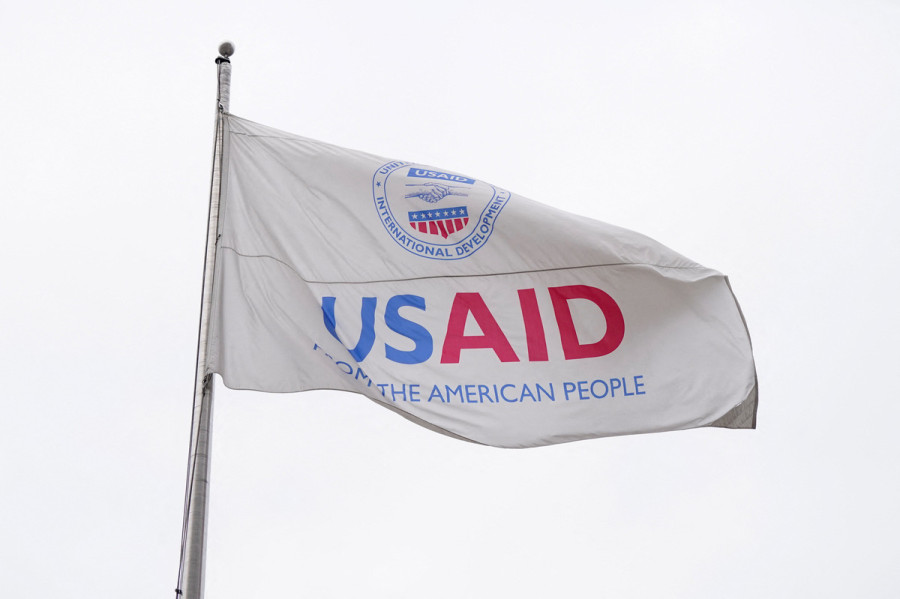Columns
USAID fiasco and the NGO ecosystem
Breaking free from the cycle of dependence requires rethinking Nepal’s development framework.
Vibhav Pradhan & Ashish Ghimire
Less than two weeks after being reinstated as the 47th President of the United States, Donald Trump has taken swift actions to fulfill his campaign promises. His new administration has frozen all foreign assistance except for military aid provided to Israel and Egypt. On February 3, Trump ordered all overseas United States Agency for International Development (USAID) missions to shut down, and all staff missions to be recalled by February 7.
This has already caused global confusion and chaos, including in Nepal where millions of dollars’ worth of US assistance, most prominently the $659 million five-year assistance commitment, is now in limbo. At the same time, the jobs of thousands of Nepali staff, contractors and consultants working in over 300 consultancies and non-profits in the country’s developing sector directly or indirectly supported by USAID now face a grim and ambiguous future.
Over the years, USAID has partnered with Nepal’s federal, provincial and local governments and the private sector to strengthen various institutions and services in areas of education, reproductive health, agriculture, disaster risk and resilience, among others. In addition, the assistance provided in reinforcing Nepal’s post-republic democratic systems and inclusive economic growth have been key areas of US support in Nepal. The positive effect of much-needed assistance from donor agencies like USAID to Nepal’s poverty reduction and socio-economic development, while sometimes controversial, is undeniable and has been an indispensable part of the country’s overall development journey.
Dependence on foreign aid
However, the Trump administration’s USAID cutbacks serve as a stark reminder of the vulnerabilities that come with Nepal's deep-rooted dependence on foreign aid and the land’s nexus of national/international Non-Government Organisation (NGO). While foreign aid has undeniably played a role in sustaining the ecosystem of Nepal's development, heavy reliance on external funding exposes the country to such unpredictable shifts in global politics. When donor priorities change, driven not by Nepal's developmental needs but by foreign political ideologies and economic agendas, the ripple effects can stall or even derail critical projects, leaving gaps that Nepal Government is ill-prepared to fill.
As such, Nepal has found itself stuck in a perpetual rabbit hole beholden to the strategic interests of foreign donors and NGO influence. Donor nations use assistance as a tool for exerting their soft power, subtly steering recipient countries to align with their own geopolitical interests. The influence of foreign donor money is not merely financial; it extends to the shaping of national development priorities, governance models and overall civic engagement and psyche.
It is safe to say that Nepal has been a playground for larger geopolitical one-upmanship of neighbouring and global powers over many decades. But years of reaping financial benefit from this tussle and being dependent on the trinkets of foreign assistance has not only undermined Nepal's sovereignty but has also enabled a development agenda that is often unreflective of local realities. This has also failed to mitigate persistent challenges of socio-economic inequities pervasive in Nepal. The Nepali government has also largely failed to effectively utilise foreign aid, with less than 15 percent of foreign grants and loans used in the first half of last fiscal year.
NGOs and the state
Moreover, Nepal's aid-dependent ecosystem has cultivated an environment where NGOs and donor agencies often act as parallel structures to the state. Many of these organisations provide essential services that are supposed to be the state’s responsibilities, thus undermining the role of the state. Nepal has also become dependent on NGOs’ humanitarian delivery role and for their specialised networks, technical capacities and innovation to ‘fill the gaps’ of the government.
But this reliance on foreign funding for a nation’s sustenance means Nepal’s national development agenda is explicitly tied to external decisions, as shown by the disruptions following USAID cutbacks. Such dependence has only weakened Nepal’s capacity to independently finance and manage its own development, thus perpetuating a cycle of dependency. And especially pertaining to Trump’s USAID cutback, global volatility that affects the inflow of foreign aid comes as a rude shock, one which has long-term potential to not just limit development but also continually trap Nepal as a geopolitical pawn.
Despite the pitfalls of being dependent on foreign aid and NGOs, the important role of these entities as key facilitators to Nepal’s policymaking role is undeniable. For instance, the role played by agencies like USAID, various UN organisations and non-state actors in general in establishing Nepal’s normative agendas on education, health, inclusion, care economy, among others, are good examples of how the ecosystem of foreign aid and NGOs have provided the financial and technical assistance that Nepal desperately needs.
In fact, many point out to the rise of liberal normative agenda in post-republic Nepal as reaffirming the critical need of these actors in steering the nation towards a more equitable republic. Their legitimacy in Nepal is also further highlighted by how well they have attained a ‘rational-legal authority’ in Nepal’s policy making and the direct role they have played in shaping the lives of millions of Nepalis.
However, taking lessons from the pros and cons of foreign aid and the NGO nexus of the past decades, Nepal must aim to cut down the vulnerabilities and pitfalls of being too dependent on such assistance. As such, the country must develop internal capacity to ensure foreign aid is mobilised following strategic long-term national benefits. While acknowledging the role of foreign aid and NGOs, it is also crucial for Nepal to diversify its development financing and climb out of the NGO and donor nexus.
Way forward
In doing so, the role of Nepali diaspora through avenues like diaspora bonds and Foreign Direct Investment could be significant. A recent Institute for Integrated Development Studies (IIDS) study on Nepali Diaspora in the United States estimated that Nepalis from the US sent $1.28 billion remittance in 2023 through formal and informal channels. Despite this significant remittance contribution, only 13.2 percent of the Nepali diaspora in the US said they have made investments in Nepal. Such data reveal newer avenues of opportunity for Nepal to further capitalise existing human capital to invest in Nepal. Diaspora initiatives like diaspora bonds could play a vital role to offset foreign assistance and lower Nepal’s debt burden. Further, Nepal must enrich growing sectors like technology and IT which have shown immense growth potential.
Breaking free from the cycle of dependence requires a reimagining of Nepal's development framework. Only then can Nepal move towards a more resilient and self-sustaining model of development—one that is insulated from the whims of international politics and decisions of eccentric world leaders.




 10.12°C Kathmandu
10.12°C Kathmandu
















